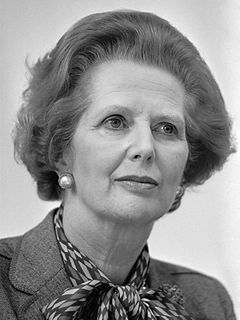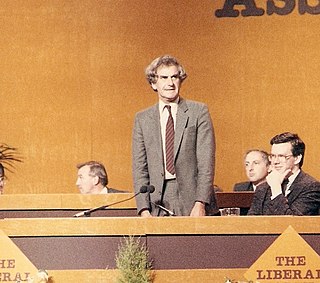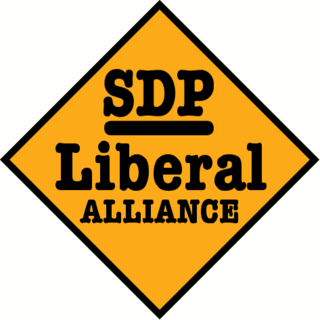This page is based on this
Wikipedia article Text is available under the
CC BY-SA 4.0 license; additional terms may apply.
Images, videos and audio are available under their respective licenses.

The 1983 United Kingdom general election was held on Thursday 9 June 1983. It gave the Conservative Party under the leadership of Margaret Thatcher the most decisive election victory since that of the Labour Party in 1945.

The 1987 United Kingdom general election was held on Thursday 11 June 1987, to elect 650 members to the House of Commons of the United Kingdom. The election was the third consecutive general election victory for the Conservative Party, and second landslide under the leadership of Margaret Thatcher, who became the first Prime Minister since the Earl of Liverpool in 1820 to lead a party into three successive electoral victories.
William Thomas Rodgers, Baron Rodgers of Quarry Bank, PC, usually known as William Rodgers but also often known as Bill Rodgers, is one of the 'Gang of Four' of senior British Labour Party politicians who defected to form the Social Democratic Party (SDP). He subsequently helped to lead the SDP into the merger that formed the Liberal Democrats, and later served as that party's leader in the House of Lords.

The Liberal Party is a British political party that was founded in 1989 by members of the original Liberal Party opposed to its merger with the Social Democratic Party (SDP) to form the Liberal Democrats. The party holds seven local council seats.
John Cameron Cartwright is a former politician in the United Kingdom. He was a Labour and then an SDP Member of Parliament (MP) representing Woolwich East then Woolwich from the October 1974 general election to the 1992 election.

The Social Democratic Party (SDP) formed in 1988 was a political party in the United Kingdom led by David Owen which lasted for only two years. The party was formed as a result of the original Social Democratic Party, created in 1981 by the ‘Gang of Four’ voting to turn its electoral alliance with the Liberal Party into a full merger of the two parties. The new Social and Liberal Democrats (SLD) party thus gained all of the records and assets of the original SDP.

The 1988 Social and Liberal Democrats leadership election was called in the United Kingdom following the formation of the then Social and Liberal Democrats. It was intended to replace the two interim leaders, David Steel and Robert Maclennan, with a single figurehead better able to represent both the former members of the Liberal Party and of the Social Democratic Party.
The Greenwich by-election of 1987 was a by-election to the British House of Commons held on 26 February 1987, shortly before the 1987 general election. The election was caused by the death of Guy Barnett, Labour Party Member of Parliament for Greenwich on 24 December 1986.

Adrian Carnegie Slade, is a British Liberal Democrat politician and advertising agency founder.
A by-election was held in the House of Commons constituency of Epping Forest on 15 December 1988 following the death of Conservative Member of Parliament (MP) Sir John Biggs-Davison. The result was a hold for the Conservative Party.
Michael Stuart Thomas is a former British politician, identified with the Labour Party until 1981 and thereafter with the Social Democratic Party (SDP). He became well known for his role in both the establishment of the SDP and then in the SDP's subsequent demise. The SDP's leader, Roy Jenkins, referred to Thomas as the "pint-sized Pavarotti", on the basis of his stocky build and beard together with his ebullient manner.
The Broxbourne Council election, 1982 was held to elect council members of the Broxbourne Borough Council, the local government authority of the borough of Broxbourne, Hertfordshire, England.

Benjamin Russell Mackintosh Stoneham, Baron Stoneham of Droxford is a British peer, journalist, and Liberal Democrat politician. He is currently the Liberal Democrat Chief Whip in the House of Lords, having been elected to that position in October 2016.
The Broxbourne Council election, 1987 was held to elect council members of the Broxbourne Borough Council, the local government authority of the borough of Broxbourne, Hertfordshire, England.
An election to Ceredigion District Council was held in May 1991. It was preceded by the 1987 election and followed, after local government reorganization, by the first election to Ceredigion County Council in 1995. On the same day there were elections to the other local authorities and community councils in Wales.
The 1992 York City Councils elections were held in May 1992 to elect members of York City Council in North Yorkshire, England. Fifteen seats, previously contested in 1988, were up for election: eleven were won by the Labour Party, three by the Conservative Party and one by the Liberal Democrats. The Labour Party retained overall control of the council; the composition of the council after the election was: Labour Party 34 seats, Conservative Party seven seats and Liberal Democrats four seats.







